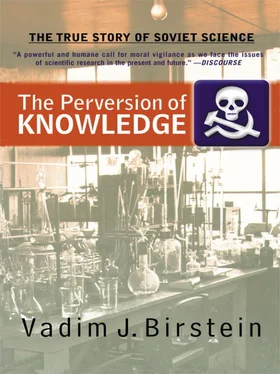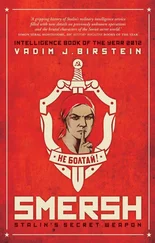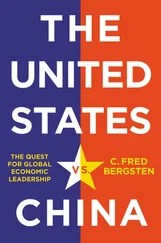Muromtsev, Sergei(1898–1960), microbiologist, worked in a secret NKVD/NKGB laboratory; experimented on humans. Graduated from the Medical Faculty of the First Moscow University (1923); a veterinarian scientist. In 1931, one of the organizers of the centralized State Control System of Veterinarian Preparations. In 1938, joined the NKVD; headed a group working on bacteriological toxins as a part of Mairanovsky’s laboratory. Also worked on a special method of preparation of vaccines for animals (1934–1943). In 1948, supported Lysenko and was one of the appointed academicians to the Agricultural Academy. Acting director of the Gamaleya Institute of Epidemiology and Microbiology within the Medical Academy (1956–1960). Due to the opposition at this institute and within the Medical Academy, not approved as director. Stalin Prize (1946).
Nasonov, Dmitrii(1895–1957), cytophysiologist. Corresponding member (1948) and a member of the Medical Academy (1945). Head of the Cytology Laboratory at the All-Union Institute of Experimental Medicine (VIEM) (1932–1945), head of the General Morphology Department at the VIEM (1945–1948), director of the VIEM (1948–1950), chair of the Department of Comparative Physiology at Leningrad University (1945–1948). Lost this position because of his opposition to Lysenko. Head of a small laboratory on general cell physiology at the Academy Zoological Institute (1951–1953). In 1954–1955, this laboratory became the Academy Institute of Cytology (IC) (formally established in 1957). Directed this institute until his death in 1957.
Nikolaev-Zhurid, Nikolai(1897–1940) joined the Special Department of the Red Army in 1919. Head of the Leningrad NKVD Regional Branch (1935–1936), then head of the Second (Counterintelligence) Department (1936–1937) and of the Fifth (Special) Department (1937–1938) of the NKVD Main State Security Directorate (GUGB). Arrested in 1938, tried and shot in 1940. Not rehabilitated (Petrov and Skorkin, Kto rukovodil NKVD , pp. 318–319).
Ogol’tsov, Sergei(1900–1977) joined the CheKa in 1919. First deputy NKGB/MGB commissar/minister (1945–1952). Responsible (the curator) for the MGB Department for Investigation of Especially Important Cases (1946–1951). After Abakumov’s arrest, acting minister (July–August 1951), Uzbek MGB minister (February–December 1952), first deputy MGB minister (December 1952–March 1953). On March 11, 1953, dismissed and on April 3, 1953, arrested on the charge of organizing the assassination of Solomon Mikhoels. Released on August 8, 1953, and dismissed from the MGB (1954). In 1959 deprived of his lieutenant general rank (Petrov and Skorkin, Kto rukovodil NKVD , p. 323; Naymov and Sigachev, Lavrentii Beria , pp. 471–472).
Oldenburg, Sergei(1863–1934), orientalist. After graduating from the Oriental Languages Department of St. Petersburg University (1885), in libraries in France and England. From 1894, professor of Indian language and literature at St. Petersburg University. Helped to organize expeditions to Tibet and Chinese Turkestan. Extraordinary academician (1903). From 1904, permanent secretary of the academy (1904–1929). Minister of education in the Provisional Government (July–August 1917). In September–October 1919, arrested as a member of the Kadet Party. In 1929, dismissed as permanent secretary. Director of the new Academy Institute of Oriental Studies (1930–1934), chairman of the Commission for the Study of the History of the Academy (1932–1934) (Tolz, Russian Academicians , pp. 108–122).
Oparin, Aleksandr(1894–1980), biochemist and author of the theory of the origin of life. Graduated from Moscow University (1917). In 1922, introduced his concept of a primordial organism arising in a brew of already formed organic compounds at a meeting of the Russian Botanical Society. In 1924, published his theory in Russian; the English version was published in 1938 (The Origin of Life) . Corresponding member (1939), academician (1946). Director of the Bach Institute of Biochemistry (1946–1980), secretary academician of the Academy Division of Biological Sciences (1949–1956). From the late 1940s to early 1950s, actively supported pseudotheories of Trofim Lysenko and Olga Lepeshinskaya. Organized the first international conference on the origin of life in Moscow (1957). In 1950, was appointed a member of the Soviet Committee in Defense of Peace and a member of the International Council for Peace. Vice president of the International Federation of Scientists (1952; 1962). Awarded many Soviet decorations.
Orbeli, Leon(1878–1958), physiologist. Graduated from the Military-Medical Academy (MMA) in St. Petersburg (1904). Academician Pavlov’s assistant at the Institute of Experimental Medicine (1907–1920); also, in Germany and Britain (1907–1920). Head of the Physiology Department at the Leningrad Medical Institute (1920–1931), and of the Physiological Department at the MMA (1925–1950); also director of the MMA (1943–1950). Director of the Institute of Physiology (1936–1950), the Institute of Evolutionary Physiology and Pathology of Higher Nervous Activity (1939–1950), and the Institute of Evolutionary Physiology (1956–1958) (all within the Academy of Sciences). Corresponding member (1932), academician (1935), member of the Armenian Academy of Sciences (1943) and the Medical Academy (1944). Secretary academician of the Academy Biology Division (1939–1948), and first vice president of the academy (1942–1946). Head of the All-Union Physiology Society (1937–1950). Forced to make many compromises, especially regarding Lysenko. Stalin Prize (1944), Hero of Socialist Labor (1945), four Lenin Order awards; colonel general (1944).
Ovakimyan, Gaik(1898–?) joined the OGPU in 1931 while a graduate student at the Bauman Higher Technical School in Moscow. Assigned to the Foreign Intelligence; deputy head of the OGPU Scientific Intelligence (1933). Sent to the United States under cover as an engineer for the American-Soviet Trading Corporation (Amtorg). Undertook study for a doctorate in chemistry at New York University. Arrested by the FBI in 1941 during a meeting with an agent. Allowed to return to Moscow. In December 1943, as head of the American Department of the First Directorate (under the alias “General Alexander Ossipov”), together with the head of the First NKGB Directorate, Pavel Fitin, took part in the negotiations with the head of the Office of Strategic Services (OSS), General William J. Donovan, about possible cooperation of the NKGB with the OSS. Left the MGB in 1947 for full-time scientific work (Haynes and Klehr, Venona , pp. 392–393; Weinstein and Vassiliev, The Haunted Wood , pp. 240–248).
Ovchinnikov, Yurii(1934–1988), bioorganic chemist. The youngest academician (elected in 1970) and the youngest vice president of the academy (1971–1988). From 1971, head of the Section of Chemical-Technological and Biological Sciences of the Academy Presidium. Directed the huge Academy Institute of Bioorganic Chemistry and was a leading proponent of using molecular biology and genetics methods for creating new types of biological warfare. Also a member of the Central Committee.
Panyushkin, Aleksandr(1905–1974) joined the Far Eastern OGPU branch in 1927. From 1938, in Moscow. Ambassador to China (1939–1944), first deputy head of the International Information Department within the Central Committee (CC) (1944–1947), chief secretary of the Committee of Information (April–November 1947), ambassador to the United States (1947–1952), and again to China (1952–1953), head of the First Main MVD Directorate (July 1953–1954), head of the First Main KGB Directorate (1954–1955). Later headed the Personnel Department of the Diplomatic and CC Foreign Economy Directorate. Retired in 1973 (Petrov and Skorkin, Kto rukovodil NKVD , pp. 333–334).
Читать дальше











